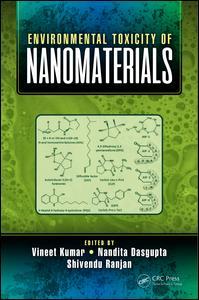Environmental Toxicity of Nanomaterials
Coordonnateurs : Kumar Vineet, Dasgupta Nandita, Ranjan Shivendu

Environmental Toxicity of Nanomaterials focuses on causes and prevention of environmental toxicity induced by various nanomaterials. In sixteen chapters it describes the basic principles, trends, challenges, and future directions of nanoecotoxicity.
The future acceptance of nanomaterials in various industries depends on the impacts of nanomaterials on the environment and ecosystem. This book analyzes the safe utilization of nanotechnology so the tremendous prospect of nanotechnology can be achieved without harming either living beings or the environment.
Environmental Toxicity of Nanomaterials introduces nanoecotoxicity, describes various factors affecting the toxicity of nanomaterials, discusses various factors that can impart nanoecotoxicity, reviews various studies in the area of nanoecotoxicity evaluation, and describes the safety and risk assessment of nanomaterials. In addition, the book discusses strategies for mitigating nanoecotoxicity. Lastly, the authors provide guidelines and protocols for nanotoxicity evaluation and discuss regulations for safety assessment of nanomaterials. In addition to environmental toxicologists, this book is aimed at policy makers, industry personnel, and doctoral and postdoctoral scholars.
1. Toxic Effects of Nanomaterials on Environment 2. Nanotoxicity: Impact on Health and Environment 3. Nanotoxicological Evaluation in Marine Water Ecosystem: A Detailed Review 4. Interaction of Carbon Nanomaterials with Biological Matrices 5. Interaction of Inorganic Nanoparticles with Biological Matrices 6. Effects of Engineered Nanoparticles on Bacteria 7. Comparative Risk Assessment of Copper Nanoparticles with Their Bulk Counterpart in the Indian Major Carp Labeo rohita 8. Toxic Effects of Nanomaterials to Plants and Beneficial Soil Bacteria 9. Nanotoxicity of Silver Nanoparticles: From Environmental Spill to Effects on Organisms 10. Nanotoxicity on Human and Plant Pathogenic Microbes and Aquatic Organisms 11. Methods of In Vitro and In Vivo Nanotoxicity Evaluation in Plants 12. In Vitro and In Vivo Nanotoxicity Evaluation in Plants 13. Phytochemicals and Their Functionalized Nanoparticles as Quorum Sensing Inhibitor and Chemotherapeutic Agent 14. Nanotoxicological Evaluation in Freshwater Organisms 15. Guidelines and Protocols for Nanotoxicity Evaluation 16. Regulations for Safety Assessment of Nanomaterials
Iqrar Ahmad Khan with long career in education and agriculture had earned PhD from the University of California, Riverside. He is currently serving as Vice Chancellor of the University of Agriculture, Faisalabad, Pakistan (since 2008). Dr. Khan has supervised more than 100 graduate students and researchers, established a Center of Agricultural Biotechnology and co-founded a DAAD sponsored ‘International Center for Decent Work and Development' (ICDD), USAID funded Center of Advanced Studies in Agriculture and Food Security, a French Learning Center and the Chinese Confucius Institute. He has organized numerous international conferences and established academic linkages across the continents. He has released a potato variety (PARS-70), pioneered research on breeding seedless Kinnow and discovered new botanical varieties of wheat. Dr. Khan initiated an internationally acclaimed program to solve a devastating problem called Witches’ Broom Disease of Lime in Oman. He is currently leading international projects to combat citrus greening disease and mango sudden death. He has published more than 270 articles, five books and several book chapters. Dr. Khan has a diplomatic skill to attract international partnerships and academic linkages (Afghanistan, Australia, South Korea, China, Germany, France, Malaysia, Indonesia, Turkey, Iran, India, Oman, Canada, UK and USA). He has managed collaborative research projects sponsored by national and international agencies. As Vice Chancellor, he has revamped UAF academic, research and outreach programs. He added new academic disciplines to narrow the knowledge gaps in microbiology, biotechnology, environmental sciences, food and nutrition, climate change, engineering, rural development and education. UAF has achieved top ranks within the national system as well as in the QS and NTU rankings. Dr. Khan has a special knack for problem solving research. He has set up an Incubation Center for the commercialization of knowledge. E
Date de parution : 04-2018
15.6x23.4 cm
Thèmes d’Environmental Toxicity of Nanomaterials :
Mots-clés :
Zinc Oxide Nanoparticles; ecotoxicology; Silver NPs; nanotoxicology; Silver Nanoparticles; marine ecosystem; ENMs; carbon nanomaterials; Biofilm Formation; inorganic nanomaterials; BY-2 Cell; engineered nanoparticles; Nanotoxicity Testing; Rajeev Kumar; Quantum Dots; Moondeep Chauhan; Comet Assay; Neha Sharma; Titanium Dioxide Nanoparticles; Ganga Ram Chaudhary; Ag Nanoparticles; Ponnala Vimal Mosahari; Manufactured Nanomaterials; Deepika Singh; Carbon Nanotubes; Jon Jyoti Kalita; DNA Damage; Pragya Sharma; Multiwalled CNTs; Hasnahana Chetia; Aquatic Organisms; Debajyoti Kabiraj; QSI Activity; Chandan Mahanta; Tobacco BY2 Cells; Utpal Bora; anti-QS Activity; Anna Giulia Cattaneo; AgNP Toxicity; S; Gajalakshmi; Tobacco BY-2 Cell; A; Mukherjee; Aeruginosa PAO1; N; Chandrasekaran; Nanoparticle Toxicity; Priya Sharma; Titanium Dioxide Nanomaterials; Praveen Guleria; Violacein Production; Changjian Xie; Xiao He; Zhiyong Zhang; Kaliappan Krishnapriya; Mathan Ramesh; Shiwani Guleria; Kevin Osterheld; Mathieu Millour; Émilien Pelletier; Adriano Magesky; Kim Doiron; Karine Lemarchand; Jean-Pierre Gagné; Akhilesh Dubey; Vishal Mishra; Sanjeev Kumar; Shahaj Uddin Ahmed; Mukunda Goswami; Ilika Ghosh; Manosij Ghosh; Anita Mukherjee; Homa Mahmoodzadeh; Brajesh Kumar; Kumari Smita; Lindsey C; Felix; Greg G; Goss; Bindu Sadanandan; Vijayalakshmi V; Mamta Kumari; Preetika Biswas; Ashutosh Yadav



